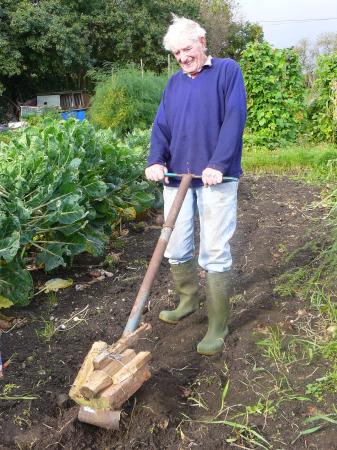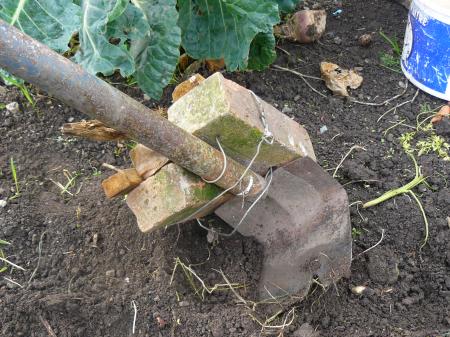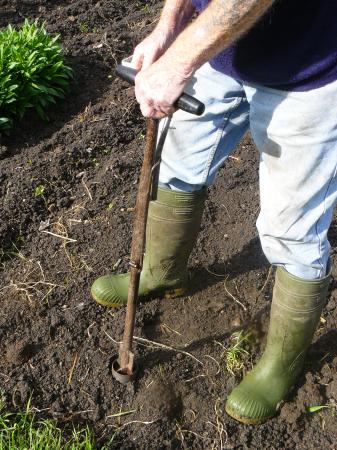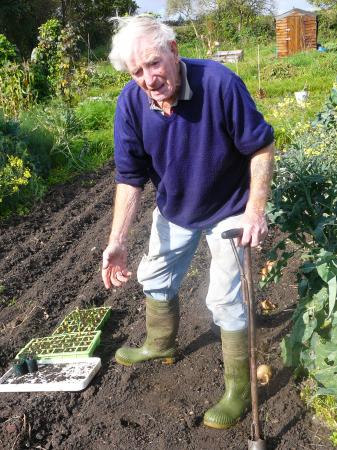Sandy Buckley: Allotment Holder Extraordinaire
Sandy Buckley: Allotment Holder Extraordinaire

A PROFILE OF SANDY BUCKLEY, ALLOTMENT HOLDER EXTRAORDINAIRE.
By the time you read this, Sandy Buckley will have celebrated his 90th birthday. But even on that special day he will probably have kept to his routine of two hours hard work in his allotment. For Sandy tends not one but two allotments and he keeps them in tip top condition. What is more, they are bigger than the standard. The National Allotment Society pronouncement is that one allotment should be 10 rods, ie an area of 100 feet x 50 feet. That was identified years ago as the area needed to “feed a family”. Sandy has 50 rods! And he has to work really hard to give his produce away. He told me that next year, he really will cut down on the number of plants he grows. But I suspect he has said that before.
I could have spent hours in Sandy’s potting shed listening to his anecdotes. For example, at 5 his doctor advised that, because he had contracted a lung disease, he should not go to school. He says “I just disappeared. I had a wonderful childhood just roaming the countryside. I taught myself to read and write (upside down and back to front!) and I learnt things by experience. I was even taught how to do Pythagoras Theorem on the school coach to Bradgate Park. No-one seemed to notice that I had sneaked on board. At 13½ , people realised that I had slipped through the education system and pointed me to the classroom. I spent a grand total of 4 months at school until I was 14 and could get a job.” Despite his lack of formal education, Sandy is an avid reader and very keen chess player.
He has always had a passionate interest in politics. When Chamberlain went to Munich in 1938, Sandy, aged 19, realised that there was going to be a war and signed up with the Royal Leicestershire Regiment as an infantryman. He spent 7 years, 14 days, 13 hours and 27 minutes as a soldier in the 2nd World War! He was very badly wounded and invalided out. He said “I couldn’t wait to get home to start gardening again”.

The period in the army was the only time that Sandy hasn’t gardened. For years, he had a patch of land in Sileby that belonged to Towles. It was during that time that he attended evening classes in horticulture at Brooksby College. He became involved in a trial to test whether deep digging was beneficial to the growth of sweet peas. His conclusion was easy: sweet peas grown on soil that had been dug to a depth of four feet were no better or worse than those grown in soil that had had no preparation. Sandy puts this conclusion to good effect in his approach to soil preparation in the allotment. He pulls a breathtakingly simple one-man “plough” through the soil. It consists of a vertical blade that is weighted with several bricks. These keep the blade pushed down into the soil to a depth of two or three inches. By pulling the plough down the length of a “furrow”, he creates a shallow trench that is ready for planting in soil with a very fine “tilth” (ie the small soil crumbs are light and airy). When I looked in other allotments, I could see different versions of this gadget. I’m not clear whether it is Sandy’s invention or as old as the hills.
He also uses another intriguing gadget. It is a mechanical “dibber”. It consists of a cylinder that is pressed a short depth into the soil. A trigger is then pulled and a core of soil is pulled out leaving a hole. Sandy says that each morning, he reads the Daily Telegraph from cover to cover and then tears it up to create tiny newspaper “modules” for his seedlings. When the seedlings are ready, he pops a module in each hole without the need to disturb the roots.
Sandy’s crops are a straightforward range of vegetables including enough potatoes and asparagus to feed his regiment plus gladioli and sweet peas…. “to improve my relationship with the ladies”.
Barrow Voice wishes Sandy a Happy 90th Birthday!










